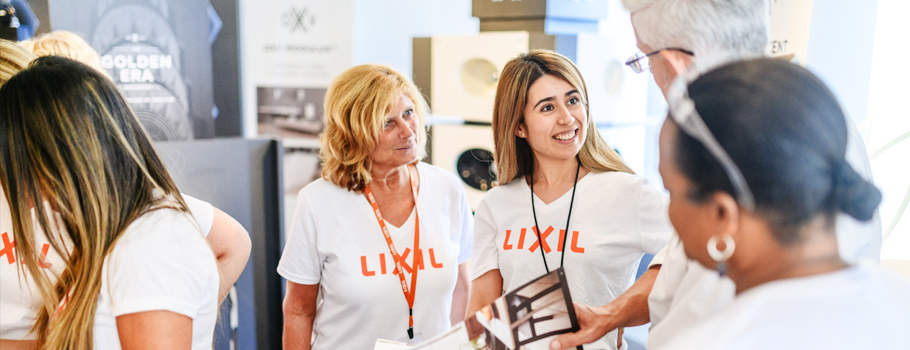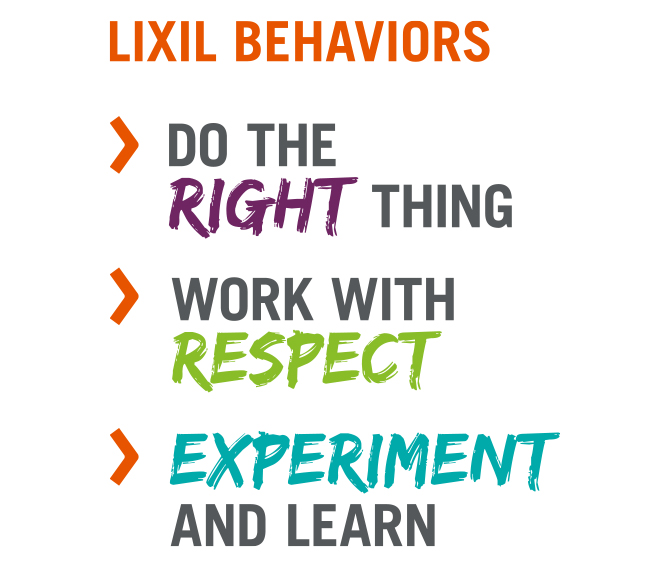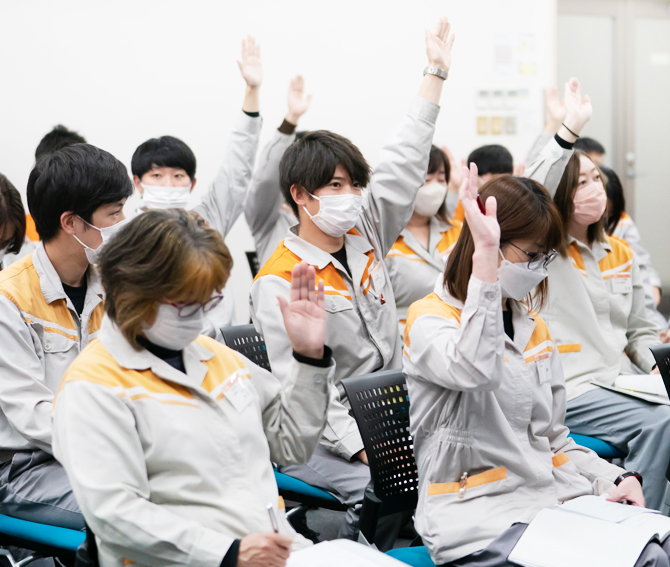LIXIL makes pioneering water and housing products that solve everyday, real-life challenges, making better homes a reality for everyone, everywhere.
- Global Site
-
- English
- Japanese
- Brand Sites
Global
- Global Site
-
- English
- Japanese
- Brand Sites

By Jin Song Montesano, Leader, People & Culture
We live amidst the Great Resignation. The Great Reshuffle. The Great Renegotiation. Call it what you will, but the world of work can never be the same. The pandemic has given new and sudden impetus to work-life trends long in the making. The home office has now become a reality for millions, and hybrid working models are increasingly the norm. At LIXIL, we believe the office is no longer a place of work but of collaboration and communication.
Faced with this paradigm shift, fostering an inclusive environment – where everyone can feel welcomed and valued – is critical to creating the highly engaged, diverse teams we need to succeed in this rapidly changing operating landscape.

Our focus at LIXIL on creating an inclusive culture pre-dates the pandemic but is undoubtedly more important than ever today. We realized that to fulfil our purpose of “making better homes a reality for everyone, everywhere”, we had to become truly consumer-centric. But to do so, we needed to better understand the diverse markets and audiences LIXIL was serving. Diverse teams can often relate and empathize the most with consumers, but if an organization's culture is not inclusive, it is difficult to sustain such teams. It was time to foster a company culture that could anticipate and understand our customers’ needs by becoming more inclusive.
And although establishing an inclusive culture is a more complex task than it might first appear, our experience shows it pays significant dividends for innovation and value creation.
Here are three key steps we have been taking to build diversity and inclusion into our DNA.
1.START WITH INCLUSION
We believe that if inclusion is our goal, diversity will be the lasting result.
We all share a desire to belong. True belonging imparts the confidence to be ourselves; to express our thoughts without fear. This, in turn, is the open and diverse input any team needs to come up with new solutions and ideas that often lead to innovation. It’s also key to becoming a more agile and entrepreneurial organization.

A crucial aspect of inclusive culture is psychological safety. Employees need to feel safe to speak their minds, suggest improvements, experiment and fail without unduly worrying about personal consequences. Work environments with high psychological safety are more dynamic and engaging because the psychological barriers to sharing and speaking up are removed.
At LIXIL, this approach is reflected in everything we do. We see our organization as a ‘great civilization’ made up of numerous cultures, all of which we embrace. Within this diverse business, the way we work as one team is through a universal set of LIXIL Behaviors: Do the Right Thing, Work with Respect, and Experiment and Learn.

One measure for the impact of our work on inclusion is the share of women in our workforce. If we can create an inclusive environment for women, we believe this will also be a proxy for broader transformation.
LIXIL has long been a male-dominated company operating in a largely male-dominated industry. In Japan, our largest and most strategic market, women make up a quarter of our employees but only represent one in 17 leaders. Yet our consumer base is as diverse as society itself. If we truly want to be an innovative and entrepreneurial company, we must build an inclusive work environment that mirrors the society we serve.
Currently, our board is 30% women, which puts us in the top 5% of companies on the Tokyo Stock Exchange1. By 2030, we will achieve a 50:50 gender ratio for directors and executive officers, and 30% female representation in managerial positions across the organization.
Creating the right environment takes the commitment of our top leaders all the way to those who work in our operations. Our human capital strategy must equip them with the tools to be people-centered leaders. To promote greater awareness and understanding of building an inclusive culture, we run regular workshops for senior management and e-learning programs for all staff to help them ‘live’ inclusion in their working environment. Our Diversity & Inclusion (D&I) team is not HR-led but made up of members from across the organization.
We are focused on D&I, not only because it’s the right thing to do, but because we believe it is critical to our long-term success. We see a direct link between an inclusive and consumer-centric approach and our ability to innovate and meet market needs.
2.LISTEN TO EMPLOYEES

Our wish is to be known as a place where our people feel cared for. We care about their career and aim to make it easy and fulfilling to work here. We care about their wellbeing and safety, and about providing satisfaction and pride in our purpose.
That’s why our employee experience strategy centers on “moments that matter”– from onboarding and promotion to life events such as getting married. We understand that the company’s response to the challenges and issues related to these moments informs an employee’s overall experience with LIXIL, either enhancing or diluting that employee’s sense of belonging and engagement with LIXIL.
For example, in a culture that is not inclusive, it can be difficult to onboard people and have them settle into new roles. In Japanese, there is even a term – Otenami Haiken – which translates roughly as “Let’s see what you can do.” Rather than taking an inclusive approach and integrating new hires with a proactive onboarding program, colleagues tend to sit back and initially observe new employees, leaving them to their own devices.
Improving the employee experience starts with listening. Using digital platforms and regular ‘pulse’ surveys, we have strengthened our ability to listen to our employees, gain important insights, and help them at all stages of their journey through the company. This includes designing a system to capture, analyze and improve those moments that matter. This way we can help managers feel more connected with their team members, and also create tailored career development options for them.
3.EMPOWER INDIVIDUALS
We abandoned any dress code, simplified reporting lines, and standardized job titles. All managers – no matter how senior – are simply referred to as “leader”. These changes all speak to the notion that every employee can be an entrepreneur and afforded the same privileges and responsibilities of any leader in a start-up.
Our CEO’s mantra is that everyone can lead – not just the person with the biggest title. Projects will not necessarily be headed by the most senior person, but by the most suitable one.
We have also been rolling out an enterprise-wide talent strategy. This may seem obvious, but in an organization born out of various mergers and acquisitions and spread across multiple geographies, there were no centrally designed company-wide programs in place for talent development, training, and leadership. We believe that an enterprise-wide approach to grading, performance management, and talent development is key to not only enhancing people’s experiences, but also building meaningful careers at LIXIL.
The most significant changes have been made within our Japanese organization. Japan is the critical financial engine that powers LIXIL’s global growth – and yet we face a shrinking market due to the country’s aging population. To react rapidly to evolving market needs, traditional seniority-based employment models must be replaced. We will install a dynamic meritocratic system and engage our workforce to be as diverse as the markets and consumers we serve.

In 2020, LIXIL launched a comprehensive employee-focused program to transform our Japan operations called Kawaranaito LIXIL (LIXIL, we must change). We introduced more transparent and performance-based work systems to replace the seniority-driven approaches of old, while implementing a slew of flexible working policies to make it easier for colleagues to fit work around their lives.
Despite being one of Japan’s largest manufacturers, we have done away with core working hours. We have also increased parental leave for childbirth and childcare, and other types of personal leave that acknowledge everybody has different needs at different times. We believe this flexible approach enables people to perform to their full potential at all stages of their career.
Toward a Consumer-Centric Mindset
All these measures aim to create a community that holds us together and a culture that is always focused on the end user. And while we’ve seen great successes to date, with pulse surveys showing a five-point increase in employees’ confidence in the future of the company, we have more work to do.
With 55,000 employees in 150 markets, this is no small transformation for LIXIL. But it’s a vital one if we are to truly deliver sustainable corporate value and keep creating innovative products that improve people’s lives.
1 As of June, 2021
Our Stories
- Backing People and Passions to Drive Innovation
- How Toilets in Schools are Catalyzing Change in Communities
- Building the Future by Recycling the Past
- Reinventing Consumer Connections in the World's Largest E-commerce Market
- Tackling Household Water Inefficiency in a Water-Stressed World
- Plugging the Plumber Shortage
- Pioneering Solutions to a Sewage Crisis in Rural Alabama
- Meet the Citizen Developers Changing How We Work
- Design and Brand Identity Transformation at LIXIL
- Three Changes to Prepare Europe’s Sanitary Industry for Growth
- Three Steps to Creating an Inclusive Culture
- From Linear to Circular: Giving Products in Your Home a New Lease of Life
- Crafting Unique Experiences as well as Products
- GROHE X: A Digital Brand Experience
- Design-led Innovation Delivering True Value
- Responsible Use of Plastics
- Empowering our People for an Agile Future
- Turning the Waves of Change into Opportunities
- SATO Tap: a New Handwashing Solution for All
- New Ways of Working Take Flight at LIXIL
- INAX: Rituals of Water
- Refreshing our sanitation targets, standing firm on our commitments
- Developing Attractive and Differentiated Products
- Conserving Water: The New Normal
- Insulating For a Warmer and Healthier Home
- Open Kitchen, Open Communication
- Tackling Open Defecation in India
- Shaping the Future of Faucets, One 3D Layer at a Time
- Bathed in Culture and Tradition
- Remodeling the Housing Market
- LIXIL's AQUA CERAMIC makes bathroom stains a thing of the past
- The Technology of Water
- Tackling Challenges in Global Sanitation and Hygiene
